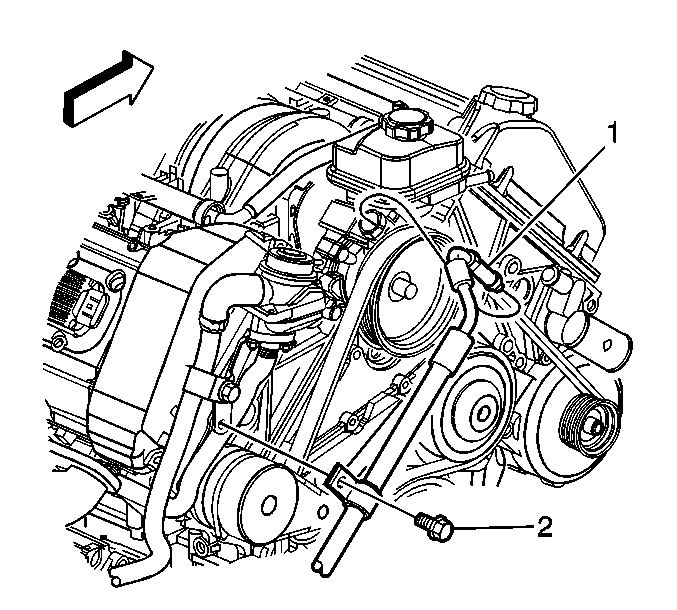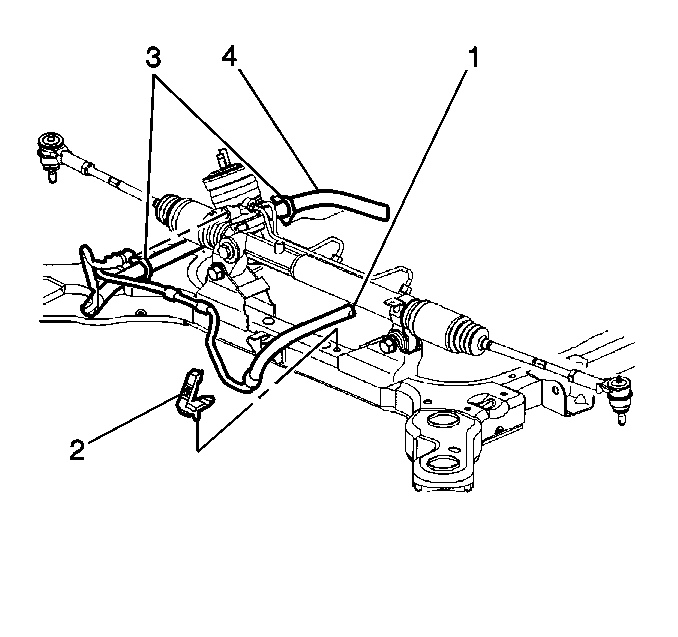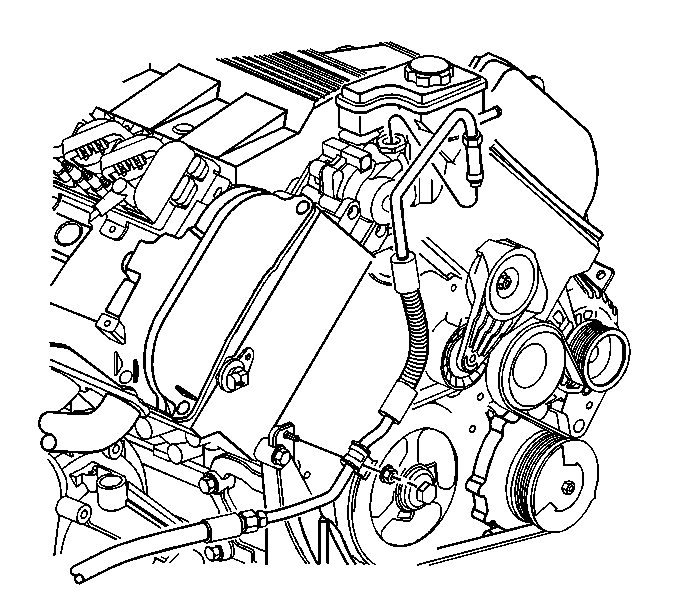Power Steering Pressure Pipe/Hose Replacement LX5
Removal Procedure
- Install a drain pan under the vehicle
- Remove the power steering pressure hose (1) from the power steering pump.
- Remove the power steering pressure hose retaining bolt (2) from the engine.
- Raise and support the vehicle. Refer to Lifting and Jacking the Vehicle in General Information.
- Remove the power steering gear heat shield.
- Remove the power steering pressure hose retainer (2) from the frame.
- Remove the power steering pressure hose (1) from the power steering gear.
- Remove the power steering pressure hose from the vehicle.


Installation Procedure
- Install the power steering pressure hose (1) to the vehicle.
- Install the power steering pressure hose to the power steering gear.
- Install the power steering pressure hose retainer (2) to the frame.
- Install the power steering gear heat shield.
- Lower the vehicle.
- Install the power steering pressure hose (1) to the power steering pump.
- Install the power steering pressure hose retaining bolt (2) to the engine.
- Bleed the power steering system. Refer to Power Steering System Bleeding in Power Steering.
- Inspect the power steering system for leaks.

Notice: Use the correct fastener in the correct location. Replacement fasteners must be the correct part number for that application. Fasteners requiring replacement or fasteners requiring the use of thread locking compound or sealant are identified in the service procedure. Do not use paints, lubricants, or corrosion inhibitors on fasteners or fastener joint surfaces unless specified. These coatings affect fastener torque and joint clamping force and may damage the fastener. Use the correct tightening sequence and specifications when installing fasteners in order to avoid damage to parts and systems.
Tighten
Tighten the power steering pressure hose to the power steering gear
to 30 N·m (22 lb ft).

Tighten
Tighten the power steering pressure hose to the power steering pump
to 30 N·m (22 lb ft).
Tighten
Tighten the power steering pressure hose retaining bolt to 9 N·m
(80 lb in).
Power Steering Pressure Pipe/Hose Replacement L47
Removal Procedure
- Raise and support the vehicle. Refer to Lifting and Jacking the Vehicle in General Information.
- Remove the power steering gear heat shield. Refer to Steering Gear Heat Shield Replacement .
- Remove the power steering pressure hose retainer (2) from the engine frame at gear.
- Remove the power steering pressure hose from the power steering gear.
- Remove the power steering pressure hose retaining nut from the cylinder head.
- Lower the vehicle.
- Disconnect the power steering pressure hose at the power steering pump.
- Remove the power steering pressure hose from the vehicle.


Installation Procedure
- Install the power steering pressure hose to the vehicle.
- Install the power steering pressure hose to the power steering pump.
- Install the power steering pressure hose bracket and retaining nut to the cylinder head.
- Raise the vehicle.
- Install the power steering pressure hose to the retainer (2).
- Install the power steering pressure hose (1) to the power steering gear.
- Install the power steering gear heat shield.
- Lower the vehicle.
- Bleed the power steering system. Refer to Power Steering System Bleeding .

Notice: Use the correct fastener in the correct location. Replacement fasteners must be the correct part number for that application. Fasteners requiring replacement or fasteners requiring the use of thread locking compound or sealant are identified in the service procedure. Do not use paints, lubricants, or corrosion inhibitors on fasteners or fastener joint surfaces unless specified. These coatings affect fastener torque and joint clamping force and may damage the fastener. Use the correct tightening sequence and specifications when installing fasteners in order to avoid damage to parts and systems.
Tighten
Tighten the power steering pressure hose to the power steering pump
to 30 N·m (22 lb ft).
Tighten
Tighten the power steering pressure hose retaining nut to 8 N·m
(71 lb in).

Tighten
Tighten the power steering pressure hose to the power steering gear
to 30 N·m (22 lb ft).
